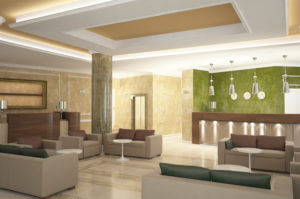 Across the nation, many hotels are accepting the demand to go green as the advantages of eco-friendly features become clearer. Embracing hospitality energy efficiency not only decreases building operating costs, but also has the opportunity to boost revenue, as well.
Across the nation, many hotels are accepting the demand to go green as the advantages of eco-friendly features become clearer. Embracing hospitality energy efficiency not only decreases building operating costs, but also has the opportunity to boost revenue, as well.
Plus, along with “boutique hotels,” “luxury hotels,” and “budget-friendly hotels,” travelers today are searching for “green” hotels. No doubt sustainability and heightened environmental standards have become a strong magnet for consumers everywhere. To stay “in the LEED,” hotels must be prepared to “up” their efficiency game.
Embracing Hospitality Energy Efficiency
A standard among green buildings, the LEED certification, the Green Building Council’s highest certification, is still relatively new. However, research shows that LEED-certified hotels might have a financial advantage over non-certified competitors. According to a 2014 study by Cornell University’s Center for Hospitality Research, LEED-certified hotels saw increased revenue per available room in the two years after becoming certified. This was more than their non-certified neighbors.
For the hospitality industry, embracing energy efficiency is not a matter of what you can do but what you should do.
Looking Ahead: Hospitality Energy Efficiency Prediction for 2017
Whether or not you are a proponent of climate change is beside the point. Especially when it comes to serving your customers well. You also have to keep pace with what’s on the forefront of the hotel industry. Energy efficiency is a game-changer and will be even more prominent this year: the new normal.
As Hospitality Net reports, adopting cleaner, more efficient electronics and equipment can save a property upwards of millions of dollars on annual energy and utilities bills.
“Just about every operation can be more efficiently managed – to name three, laundry units that more effectively recycle water, new OLED TVs that cut down on power usage or smarter thermostats that better regulate room temperatures. There are also guest-facing savings programs like towel reuse, keycard-activated lighting and carbon offset donations, all of which help to some degree and, more importantly, help people become accustomed to this new normal.”
LEED by Example for Sustainable and Profitable Results
The Proximity Hotel in Greensboro, North Carolina, was the country’s first hotel to achieve LEED platinum status. The rooftop solar panels heated water, powered ultra-efficient appliances and generated power for elevators. The Proximity Hotel used almost 40 percent less energy than other hotels the same size. Within only four years, the extra costs paid for themselves in energy savings and tax credits.
So, the result is a hotel that’s both sustainable and profitable.
Getting Started
Hospitality facilities, such as hotels and restaurants, present their own unique and specific set of engineering challenges for effectively minimizing the amount of energy required for operations.
KMB has the vast experience necessary to provide energy-efficient hotel system designs. These designs will enhance the look, feel and function of your space. Cooking, water heating, refrigeration, space heating and cooling, and entertainment will see improvement.
Contact the experts at KMB Design Group to learn more about pursuing a LEED Certification. We can help you incorporate green building practices into your next project!